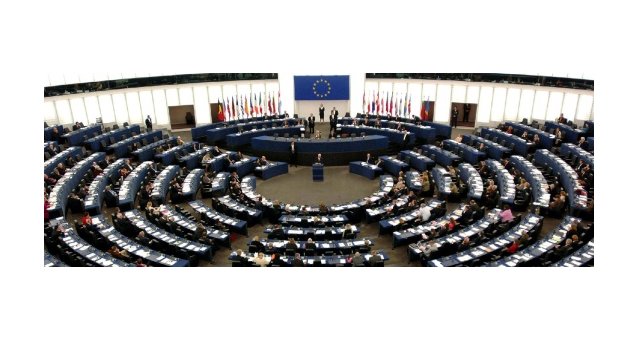Precarious workers - MEPs say more legislative measures needed
EP Press Release 19 October 2010

Having been disappointed with the EU employment law package and the directives on fixed-term, part-time and temporary agency work not adequately addressing the precarious nature of employment, Parliament urged Commission and Member States, in its report adopted on Tuesday, to take further specific legislative measures, such as introducing binding minimum social standards for employees and granting all employees equal access to social services and benefits regardless of their employment conditions.
The over-representation of women in precarious work is a key contributing factor to the gender pay gap remaining at a persistent high level, said MEPs in the adopted report on precarious women worker drafted by Britta Thomsen (S&D, DK). They believed that improving the job quality for women would reduce the gender pay gap. MEPs also stressed the need for legislative measures to secure gender equality and reduce gender segregation in the labour market. Therefore, Parliament urged the Commission to submit a proposal relating to the application of the principle of equal pay for men and women.
Participation in labour market
Calling on the Member States to deliver on the Barcelona childcare targets in order to improve labour market participation and economic independence of women, Parliament stressed, in addition, the need for women, after stopping work due to the birth of a child, to actively pursue a return to work. Member States should overcome obstacles which keep women from working the number of hours they want, whether in part-time or full-time work.
MEPs pointed out the gendered nature of precarious employment and recalled the shift in the labour market from standard to nonstandard types of employment. In the report, precarious work refers to ‘non-standard’ forms of employment with any of the following characteristics:
- little or no job security owing to the non-permanent, often casual nature of the work, with contracts containing poor conditions or without any written contract;
- a low level of remuneration, which may even be unofficial and unclear;
- no social protection rights or employment-related benefits;
- no protection against discrimination;
- limited or no prospects for advancement in the labour market;
- no collective representation of workers;
- a working environment that fails to meet minimum health and safety standards,
It is necessary to prevent non-standard types of employment becoming precarious work, MEPs argued. Member States and social partners must be asked to align to a large extent their legislative and contractual rules on standard work and atypical work, so as to prevent the most convenient and least expensive forms of work from taking precedence.
Member States should also take legislative measures to bring an end to zero-hour contracts, which are common in jobs typically occupied by women in sectors such as domestic work, care work, catering and the hotel industry, MEPs argued.
Parliament also called on Member States to implement legislation ensuring reasonable limitation of working hours, rest and leisure for workers.
They also considered that the sustainability of the pension schemes, loan facilities for self-help projects as well as job creation and alternative income creation schemes can improve conditions for precarious women workers.
Raising awareness and educating people
Professional and sectoral segregation on the labour market should be broken down through awareness-raising and education from an early age. This can be for instance by promoting jobs associated with female skills to men, and vice versa, by motivating girl students towards sciences, and by combating the perception of women as second earners.
Furthermore, Members of Parliament called on the Commission and Member States to plan and implement measures to facilitate satisfactory education, training and studies for girls and young women, providing particular support for girls and young women with a migration background.
Decent jobs demanded
The European Commission and the Member States are asked to develop strategies on precarious work to emphasize decent and green jobs and incorporate gender balance. MEPs stressed the need to ensure that precarious domestic care jobs are transformed, wherever possible, into decent, long-term jobs.
Seasonal and migrant workers
Members of the Parliament called on Commission and Member States to adopt legislation regulating the social and legal status of seasonal workers and to provide them with social security cover.
The social integration of migrant women is even more difficult than that of their male counterparts, said MEPs, encouraging therefore employers to take specific measures to facilitate the social integration of women migrant workers. Employers should also ensure that migrant workers are registered, so that they are entitled to benefits.
Further information:
Adopted text will be available here (click on 19 October):
http://www.europarl.europa.eu/activities/plenary/ta/calendar.do?language=EN
Watch the debate here (click on 18 October):
http://www.europarl.europa.eu/wps-europarl-internet/frd/vod/research-by-date?language=de
Profil of rapporteur:
http://www.europarl.europa.eu/members/expert/searchForm/view.do?language=EN&partNumber=1&name=thomsen&id=28153
Report on precarious women workers:
http://www.europarl.europa.eu/sides/getDoc.do?type=REPORT&mode=XML&reference=A7-2010-0264&language=EN
OEIL - Legislative Observatory:
http://www.europarl.europa.eu/oeil/file.jsp?id=5838652
Contact:
Ayla Sultan ÇIÇEK
European Parliament - Press Service
Email: femm-press@europarl.europa.eu
GSM: (32) 498 98 13 37
BXL: (32-2) 284 10 09




